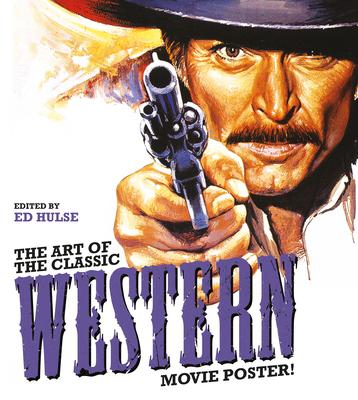
More than 800 images--many reproduced as full-page--make this the most comprehensive book of western movie poster art ever published, and the definitive history of a genre often underestimated for its impact on American audiences.
One of the earliest narrative films, 1903's The Great Train Robbery, was a western, and before commercial cinema was a decade old the form had proliferated to such an extent that practically every nickelodeon in the country used short-length shoot-'em-ups in their daily programs.
The book begins with a fact-heavy introduction that details how western movies became popular as a result of America's fascination with the Wild West, as portrayed in dime novels and pulp-fiction magazines.
How and when the genre archetypes--white hat vs. black hat, the cowboy's love for his horse, the western hero as roving do-gooder--were fixed is discussed.
The difference between "A" and "B" movies and which westerns fit into those categories are also explained ("A"s including such movies as Stagecoach, Destry Rides Again, and True Grit, and "B"s such films as Gold Mine in the Sky, Saga of Death Valley, and Hopalong Cassidy, and the likes of Gene Autry and Roy Rogers).
Each chapter devotes a special feature to a specific "western" star, writer, director, stuntman, or leading lady.
Also included are the author's firsthand interviews conducted from as far back as the mid-1970s.
This unique book is a celebration of the American motion picture's first and most enduringly popular genre.
More than 800 images--many reproduced as full-page--make this the most comprehensive book of western movie poster art ever published, and the definitive history of a genre often underestimated for its impact on American audiences.
One of the earliest narrative films, 1903's The Great Train Robbery, was a western, and before commercial cinema was a decade old the form had proliferated to such an extent that practically every nickelodeon in the country used short-length shoot-'em-ups in their daily programs.
The book begins with a fact-heavy introduction that details how western movies became popular as a result of America's fascination with the Wild West, as portrayed in dime novels and pulp-fiction magazines.
How and when the genre archetypes--white hat vs. black hat, the cowboy's love for his horse, the western hero as roving do-gooder--were fixed is discussed.
The difference between "A" and "B" movies and which westerns fit into those categories are also explained ("A"s including such movies as Stagecoach, Destry Rides Again, and True Grit, and "B"s such films as Gold Mine in the Sky, Saga of Death Valley, and Hopalong Cassidy, and the likes of Gene Autry and Roy Rogers).
Each chapter devotes a special feature to a specific "western" star, writer, director, stuntman, or leading lady.
Also included are the author's firsthand interviews conducted from as far back as the mid-1970s.
This unique book is a celebration of the American motion picture's first and most enduringly popular genre.
Hardcover
$59.99